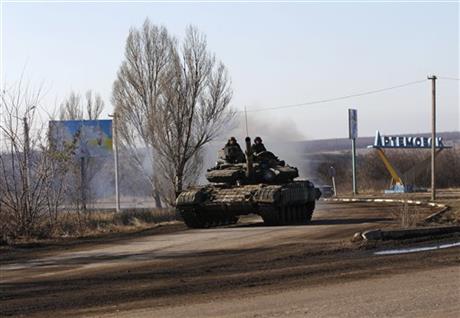
By BALINT SZLANKO
Fierce fighting surged in east Ukraine as Russian-backed separatists mounted a major and sustained new push Friday to capture a strategic railway hub ahead of a weekend cease-fire deadline.
Clashes appeared only to have increased in the day since a peace agreement was sealed in the Belarusian capital of Minsk by the leaders of Russia, Ukraine, Germany and France. German Chancellor Angela Merkel cautiously described the agreement negotiated Thursday as “a glimmer of hope.”
The government-held railway town of Debaltseve was on the receiving end of dozens of artillery and rocket salvos in the 24-hour period following the Minsk talks, Ukrainian military officials said.
Associated Press reporters Friday observed intense shelling along the highway north of the town, which remains the only land link between Debaltseve and the remainder of government-controlled territory.
The deadline for the warring sides to halt hostilities is set to take effect on Sunday, at one minute after midnight. Interfax-Ukraine news agency quoted Petro Mekhed, Ukraine’s deputy defense minister, as saying separatist forces had been given the task of hoisting their flags over Debaltseve, as well as the port city of Mariuopol, by Sunday.
Military spokesman Andriy Lysenko said Friday that 11 soldiers were killed and another 40 wounded over the previous day. Regional authorities loyal to Kiev reported six civilian deaths in areas under their control, while rebels said seven people were killed in artillery attacks on the separatist-held cities of Luhansk and Horlivka.
Separatist forces recently have nearly completely encircled Ukrainian forces in Debaltseve, where all but a few thousand civilians have fled to areas away from the front.
Ukraine says that Debaltseve should remain in government control under the terms of a September peace deal that traced the contours of the front line. A copy of that agreement leaked to Ukrainian media last month shows the town lying on the government’s side of the line of contact agreed by rebel and Ukrainian officials alike.
Ukrainian access to the sole highway still linking the town to government-held territory looks to have compromised with the apparent capture of the village of Lohvynove, which lies along the road, just north of Debaltseve. AP reporters on Friday morning saw the smoldering remains of two Ukrainian army trucks near the village of Luhanske, some 10 kilometers up the road from Lohvynove.
The Donbass Battalion, a unit with Ukraine’s National Guard engaged in battles around Lohvynove, said in a statement that captured combatants had confirmed Russian troops were actively involved in battles.
Moscow vehemently denies that it provides manpower and weapons to the rebel forces, although the sheer quantity of powerful weapons at the separatists’ disposal has increasingly strained that position.
Russian state news agency RIA-Novosti quoted Kremlin spokesman Dmitry Peskov as saying Friday that Moscow would act only as a guarantor in the peace process but that it could not affect developments on the ground.
“We simply cannot do this physically, because Russia is not a participant in this conflict,” Peskov was quoted as saying.
Elsewhere, by the Azov Sea in the southeast, Ukrainian government troops say they clawed back a handful of villages. Troops there have denied reporters access to the areas at the center of those operations, which are aimed at pushing back rebel forces from the city of Mariupol.
The cease-fire is to be monitored by the Organization for Security and Cooperation in Europe’s observer mission in Ukraine.
OSCE Secretary General Lamberto Zannier said in Kiev that he hoped hostilities would be halted by the deadline.
“We would really hope to see a decrease already between now and that moment,” he said.
Zannier said that combatants would have to do more to enable the OSCE peace-monitoring mission, which makes ample use of drone cameras, to properly fulfil its mandate.
“Aerial vehicles have been targeted more than once, monitors have been taken hostage, so we need a change of attitude,” he said.
The next step, to begin on Monday, is to form a sizeable buffer zone between Ukrainian forces and Russia-backed rebels. Each side is to pull heavy weaponry back from the front line, creating a zone roughly 30-85 miles (50-140 kilometers) wide, depending on the caliber of the weapons. The withdrawals are to be completed in two weeks.
Other thorny political questions, including a degree of autonomy for the disputed eastern regions, are to be settled by the end of the year.
The peace deal envisions an amnesty for people involved in the conflict, but the vague terms of that provision will likely be subjected to further disagreements and negotiation.
Speaking to parliament, Ukrainian Foreign Minister Pavlo Klimkin said amnesty would not be granted to anybody suspected of committing crimes against humanity.
“This is an absolute position that was unambiguously underlined during (Thursday’s) negotiations,” Klimkin said.
___
Associated Press journalists Peter Leonard and Alexander Roslyakov in Kiev, Ukraine, and Laura Mills in Moscow contributed to this report.


